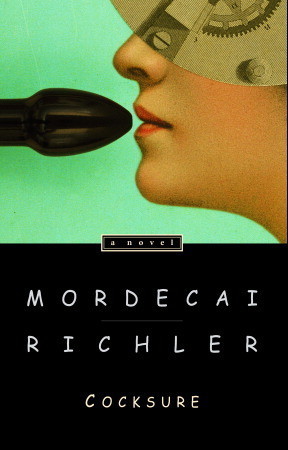What do you think?
Rate this book


224 pages, Paperback
First published January 1, 1968
As with A History of the World in 10½ Chapters by Julian Barnes, Cocksure by Mordecai Richler was a birthday gift from my university friend Christine Smereczynsky. I received it before the Barnes novel, so I have had it for more than thirty years. It has thus taken me three decades to read her birthday gifts.
I had to read several chapters before I realized what was going on in Cocksure. Richler presented the novel as if the reader was interrupting the narrative. This method of storytelling meant that the reader had to accept whatever the author had written, with no antecedents or other background information, and then piece it together. The novel was heavy on dialogue yet Richler made it easy to figure out who was speaking without having to identify the speaker all the time, thus avoiding inelegant “he said” or “Mortimer replied” structures.
Richler’s writing style from 1968 reminded me of Terry Southern’s in Candy, which was composed of short lines and filled with gratuitous sex scenes. The title is a double entendre on the protagonist Mortimer Griffin’s insecurity over his virility and size of his manhood. Cocksure did not lend itself to lengthy pages of description, so ongoing themes of impotence, premature ejaculation, penis size and fellatio were thankfully merely mentioned and not elaborated upon. Thus these passages seemed to be there only as a reason for the author to find another pun on the novel’s title. The real plot of the novel–Mortimer’s promotion to the head of a publishing house run under the omniscience and paranoia of a Big Brother character named Star Maker–is never advanced to the point of the reader caring.
The action took place in London in the late sixties, and I liked the allusion cited below, although it seems dated now:
“Among the literary lionesses who were making London a Saigon of the Sex War, Daphne’s name was writ large.”
Richler would often write contradictory statements on the same page. For careful readers like myself, I would restart the entire page to ensure I hadn’t misread it. Yet his frequency in doing this eventually led me to accept it as intentional. The contradictions played like a movie as I could picture the abrupt about-faces better on a screen. In fact, the novel’s structure (37 chapters over 250 pages) made it a perfect fit for a Warhol movie, with its multiple chapters suited to quick strobe cuts where nothing really happens.
The back cover of the book included the plug as a “brilliantly funny satire” and it is, especially of Hollywood and its creation of vapid vanilla movie stars. Running jokes throughout the novel involve Mortimer doubting his sexual orientation and others convinced he is Jewish. Racist, homophobic and anti-Semitic epithets run throughout Cocksure, so readers be warned. Mordecai Richler is a leading writer of English Canadian fiction yet I would not recommend this novel as an introduction to the Richler oeuvre.